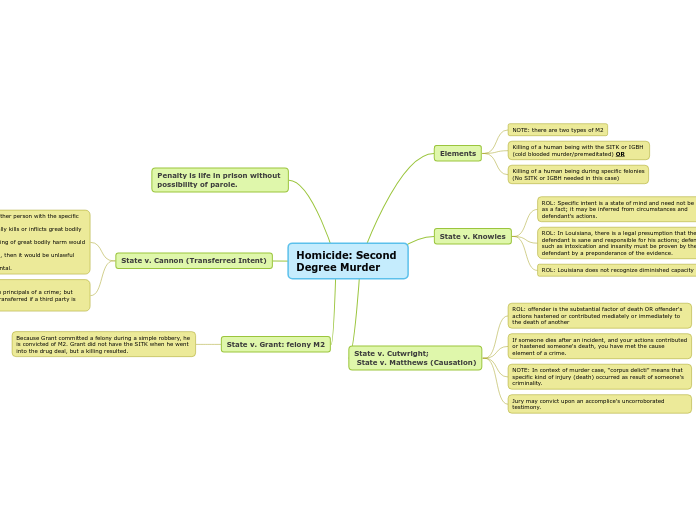Homicide: Second
Degree Murder
Elements
NOTE: there are two types of M2
Killing of a human being with the SITK or IGBH
(cold blooded murder/premeditated) OR
Killing of a human being during specific felonies
(No SITK or IGBH needed in this case)
State v. Knowles
ROL: Specific intent is a state of mind and need not be proved as a fact; it may be inferred from circumstances and defendant's actions.
ROL: In Louisiana, there is a legal presumption that the defendant is sane and responsible for his actions; defenses such as intoxication and insanity must be proven by the defendant by a preponderance of the evidence.
ROL: Louisiana does not recognize diminished capacity
State v. Cutwright;
State v. Matthews (Causation)
ROL: offender is the substantial factor of death OR offender's actions hastened or contributed mediately or immediately to the death of another
If someone dies after an incident, and your actions contributed or hastened someone's death, you have met the cause element of a crime.
NOTE: In context of murder case, “corpus delicti” means that specific kind of injury (death) occurred as result of someone's criminality.
Jury may convict upon an accomplice's uncorroborated testimony.
Penalty is life in prison without
possibility of parole.
State v. Cannon (Transferred Intent)
ROL: When a person shoots another person with the specific intent to kill or inflict
great bodily harm and accidentally kills or inflicts great bodily harm upon a
third person, the killing or inflicting of great bodily harm would have been
unlawful against the first person, then it would be unlawful against the third
person even though it be accidental.
Remember:
CANNOT transfer intent between principals of a crime; but intent to kill one victim can be transferred if a third party is killed.
State v. Grant: felony M2
Because Grant committed a felony during a simple robbery, he is convicted of M2. Grant did not have the SITK when he went into the drug deal, but a killing resulted.
